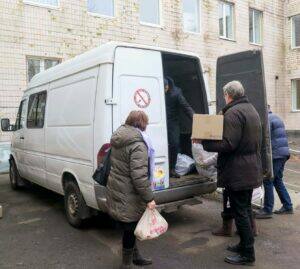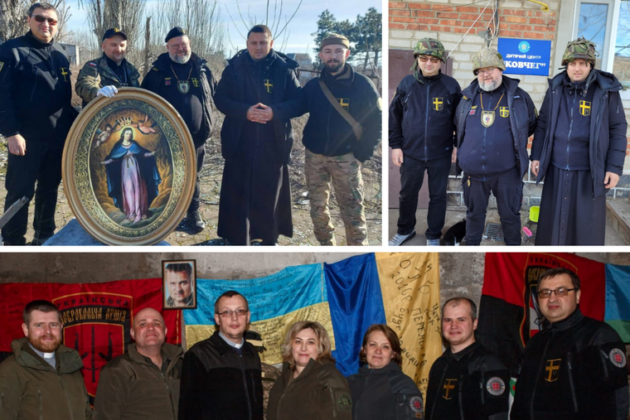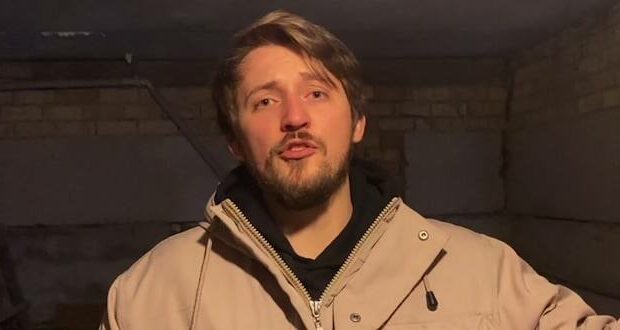Metro Voice has gathered first-hand testimonials from Christians living and serving in ministries in Ukraine. Make Ukraine a top priority of your prayer time. Communication with some of those below has now been cut off and current reports are not possible.
Escape From Kyiv
A Christian aid worker flees with her family as Putin’s army closes in
From Mission Eurasia (missioneurasia.org) – Nadia Matviichuk’s husband shook her awake at 6 a.m. on Thursday in their home in Kyiv, Ukraine. Russia had invaded, he said. She needed to pack so they could be prepared to leave. Her friend, a police officer, messaged her saying, it’s serious—Russia has really invaded. Nadia, a translator for the Kyiv-based Christian nonprofit Mission Eurasia, felt panic coming on; she wanted to get out as soon as possible. She woke her daughters, who are 16 and 12, and told them to start packing. She started throwing things in her suitcase as her husband packed their documents into a little bag. He questioned whether they should wait and see how things develop.
“No, no. We have to go!” Nadia said. An hour later, they were throwing their suitcases into their small black SUV. They could hear bombs and shots in the distance. Nadia didn’t think this would ever happen to them. She was leaving her home, a small, one-story house with a giant fireplace in the middle built in 1956 that she and her husband had restored. She didn’t know if it would still be there when she went back—or if she’d get to go back. They got out of the city, and she finally let her breath out. She hadn’t brushed her teeth or her hair. She didn’t know what was in her suitcase.
Thursday morning, Russian forces began advancing into Ukraine after building up a military force 150,000 strong along the country’s borders. Artillery descended from the north, east, and south. Russian President Vladimir Putin said he would not attack the cities. But after several days of fighting at key military and government installations, skirmishes began on the outskirts of the capital of Kyiv. Ukrainian President Volodymyr Zelenskyy warned residents who had not already evacuated to stay inside and prepare for fighting in the streets.
Many residents of Kyiv, like Nadia and her family, left when the invasion began. Early Thursday, vehicles clogged the roads to the western city of Lviv. Nadia and her family set out for the Polish border. Once on the road, they called her husband’s uncle and asked if he wanted to come with them. He doesn’t have any family except for them and lived in a city on their way. At first he said no, but after he watched the news for a few hours, he called.
“Can I change my mind?” he said. “Can I go with you?”
They stopped, packed him into the SUV, and kept going with him in the front seat with Nadia’s husband and Nadia and her daughters in the back. Her youngest had been hugging her the whole time. They kept saying they were scared and wanted to get to Poland.
A few hours later, they got close to the border. Cars were backed up almost seven miles. Nadia realized she didn’t pack any books. What were they going to do with their time when they got to Poland?
Four hours passed. No bathroom breaks. It was getting dark. They were listening to the radio when the newscaster said men ages 18 through 60 were not allowed to leave Ukraine.
Nadia looked at her husband and his uncle. She looked at her daughters. The traffic was still stopped. They saw women and children getting out of their cars and walking to the border with suitcases while the men in the vehicles turned back and headed home. Nadia and her family sat there a while longer. Her friends called and said it wasn’t worth trying to cross the border. Nadia felt sick to her stomach.
They turned around.
Nadia and her family decided to head toward Western Ukraine. She has relatives there. Her plan is to stay there, maybe hide in the western mountains. As of Saturday, nearly 120,000 Ukrainians had left the country for Poland, Moldova, and other neighboring nations, according to the UN. Authorities in those countries mobilized to receive the Ukrainians, providing shelter, food, and legal help. They also eased their usual border procedures, including COVID-19 testing requirements.
Sergey Rakhuba, president of Mission Eurasia where Nadia works, said his organization originally planned to move most of its staff to Moldova, where it has a ministry hub, in the event of an invasion. Six ministry workers would remain in Ukraine to help coordinate food and medical relief distribution. When I talked to him Saturday, he said that many workers had crossed the Moldovan border once it reopened, but six families decided to go to a safe place in western Ukraine after martial law had been instituted and their husbands were not able to leave the country. The families started one of the first Christian-led refugee centers in Ukraine. Mission Eurasia has also set up a refugee center in Moldova, and they are trying to prepare to serve some millions of refugees as the war continues. There are still some ministry workers within Ukraine’s cities hiding in basements and bomb shelters, he said. Though the internet is down in some places, he’s still getting the occasional text with updates.
As of Saturday, Nadia and her family were safe, and she was coordinating communications for the ministry, Rakhuba said. For their protection, WORLD agreed not to share the names of Nadia’s family members or details of where they are now.
As she drove away from the border on Thursday, the only thing Nadia remembered putting in her suitcase was her Bible. It was dark. If Russia took over Ukraine, she said, she said did not want to go home. “I’d rather start my life over from scratch than live under tyranny like that,” she said.
A message from a pastor inside Ukraine recorded by the Far East Broadcasting Company.
Ukrainian and Russian pastors launch humanitarian outreach
“Unstoppable” local churches in Ukraine and Russia are launching a large-scale humanitarian outreach across Ukraine as war erupts around them and many suffer.

Bringing food and supplies to orphanages.
Supported by U.S.-based Slavic Gospel Association (SGA, www.sga.org), the church-driven emergency response is providing food, winter clothes, blankets and medicines for thousands of at-risk people, including orphans, children separated from their parents, as well as children with special needs.
“While others are fleeing, local churches are engaging,” said Eric Mock, SGA’s vice president of ministry operations. “They’re bravely rushing to help those in need right now. They’re unstoppable in the face of this crisis.”
Local believers are also visiting orphanages and children’s homes, reassuring frightened and “forgotten” children, and sharing God’s love with them.
“These children are already full of brokenness,” Mock said. “Now they’re full of fear.”
Compassion Knows No Borders
Over decades, SGA has built strong partnerships with evangelical pastors and churches in both Ukraine and Russia — a ready-made relief force in emergencies.
Partnering with a network of more than 2,300 Ukrainian and Russian pastors — including 40-plus churches in eastern Ukraine where the fighting is most intense — the Illinois-based organization expects to exceed the 175,000 meals already provided monthly, and the need is only growing.
The Gospel ministry’s “Winter Warmth” outreach provides shivering families with warm clothes, while its “Family Survival Packs” — containing blankets, medicines and food — will be a lifesaver for those forced to flee their homes under fire.
“IDPs (internally displaced people) are already on the move,” Mock said. “We’re supporting the local churches, so they can share the hope of the Gospel along with vital aid.”
Russian, Ukrainian Churches ‘United by Faith, Family’
“There are Russian pastors in Ukraine, and Ukrainian pastors in Russia,” Mock said. “It’s impossible to separate them.”
Many families are interconnected, and pastors on both sides of the border talk to each other constantly.
“There’s great unity and a strong bond between the Russian and Ukrainian pastors and their churches,” said SGA’s president Michael Johnson.
“It’s a picture of God’s perfect Kingdom versus man’s broken one.”
An on-air broadcaster with Far East Broadcasting asking for prayers
Igor and his family are still in Kyiv. As the crisis in Kyiv began on Feb 24, Igor and Emma released a video from their apartment in Kyiv. Now they and their daughters are in a bomb shelter in Kyiv. Please continue to pray!
Testimonies of Catholics and others on the ground
“My mom woke me up in a panic, saying there was something going on,” Darina Rebro, a Kyiv-based staff member of online ecumenical media Christians for Ukraine, said in a Feb. 24 phone interview with the Register following the attack, reporting that explosives fell only three metro stations away from where she lives.
Over the past few months, her media apostolate has been striving, together with other religious communities, to bring support to an overwhelmed population through quality information, Bible-inspired news commentaries, useful tips on what to do in case of a Russian attack, where to hide and how to provide first-aid care.
“We’ve lived in a situation of deep tension for months and months, and we were hoping that a war could be avoided,” Rebro continued. “At the beginning, people were very scared, but fear can never endure for too long; and at some point, people became annoyed, they got angry and learned how to defend themselves.”
To date, the conflict has resulted in the deaths of at least 102 civilians (according to U.N. estimates) and has created hundreds of thousands of Ukrainian refugees.
A curfew was established in Kyiv Feb. 26-28. In the streets of the Ukrainian capital, barricades have been erected, and the authorities have called on the population to arm themselves. Russian and Ukrainian delegations began negotiations at the Ukraine-Belarus border on Monday against a background of nuclear tension — but with no apparent prospect of an end to the crisis at this time.

(Clockwise from Left) Taken at the end of January during a prayer for the consecration of the village of Shirokine near Mariupol, where fierce fighting took place in 2014-2015, and now completely destroyed and uninhabited. Participants are CRS founder Andriy Olenchyk, General of the Order of the Knights of St. John Paul II Krzysztof Wonsowski, CRS Military Chaplain Corps Priest and National Chaplain of the Ukrainian Province of Oleksandr, Coordinator of CRS-Warsaw and Ukrainian provincial General Chapter of the Order of the Knights of St. John Paul II, Volodymyr Korchynsky, head of CRS-Mariupol and Grand Knight of the local banner General Chapter of the Order of the Knights of St. John Paul II, Volodymyr Zavadsky. Taken at the frontline village of Pionerske’s children’s center “Ark of Peace”, launched by missionaries of the Christian Rescue Service unit including CRS founder Andriy Olenchyk, General of the Order of the Knights of St. John Paul II Krzysztof Wonsowski, CRS Military Chaplain Corps Priest and National Chaplain of the Ukrainian Province of Oleksandr. Roman Catholic parish of Christ the King of the Universe in Khmelnytsky, February 23. Participants are representatives of the leadership teams of CRS. The subject of the meeting was the launch of the process of deploying a network of crisis humanitarian centers based on parishes and church communities. (photo: Courtesy photos / CRS)
Assisting Civilians
Meanwhile, in the rest of the country, local Catholic churches and communities are sparing no effort to assist the population in their collective trial, organizing the provision of shelters for refugees along with a range of other humanitarian and medical aid to all civilians hit by the bombing and shooting.
Vita Jakubowska, a member of the Latin Rite Catholic community of Lviv and a journalist for Catholic portal CREDO.pro, said in a Feb. 25 email to the Register that, the day before the Russian invasion, Christian Rescue Service — a fraternity founded by Ukrainian Catholics in 2015 as a response to the Russo-Ukrainian War that focuses on the service to the Ukrainian people in extreme conditions, especially war — managed with the help of Dominican priests to evacuate several groups of children from territories that were hit by air strikes shortly after.
The country’s various dioceses and parishes are holding in parallel prayer vigils, with the recitation of the Rosary and votive Masses for peace. Additionally, Ukrainian Catholic bishops, together with their local priests and faithful, are taking an active part in the ongoing world prayer marathon for peace in Ukraine.
“We, the clergy, the priests and bishops are staying with our people. We won’t leave the country,” Auxiliary Bishop Edward Kawa of Lviv told the Register Feb. 24, in a voice tinged with both determination and concern, commenting that the Catholic Church in Ukraine “unambiguously condemns this act of aggression on the Ukrainian state, which has endured for eight years now, but that is getting more intense today.”
Standing Up as Children of God
For his part, Andriy Olenchyk, founder of Christian Rescue Service and a member of the General Chapter of the Order of the Knights of St. John Paul II, does not mince his words with regard to what he calls “the Russian threat,” which he places alongside gender ideology, rampant Islamization and modern neo-paganism as issues that require a full return to the foundations of Europe’s Christian civilization. “We are counting on a new alliance with the peoples of the Mediterranean, with whom we are united by faith, historical memory and common challenges,” he told the Register in a Feb. 27 conversation.
Composed of chaplains, peacekeepers and socio-missionaries, this rescue fraternity — which is open to Christians of all denominations — is now on the front lines of the armed clashes that are taking place throughout the country, initiating the creation of a network of crisis humanitarian centers relying on Catholic parishes and church communities, and helping form local territorial defense units.
“We are convinced that in these times of adversity, we have a duty to act courageously, serving God and Ukraine, our motherland,” Olenchyk said. “As Christians, we can’t allow ourselves to be afraid, to hide or flee, behaving not like the children of the Promise, but like Gentiles who do not know God.”
“If we do not fully remain the light of the world and the salt of the earth in such times, then what will remain of this salt and light?” he continued, based on his conviction that “this is not the time or place for a warm, decorative, lazy, timid, spineless, pacifist Christianity.”
–Compiled by Dwight Widaman | Metro Voice
 Metro Voice News Celebrating Faith, Family & Community
Metro Voice News Celebrating Faith, Family & Community









